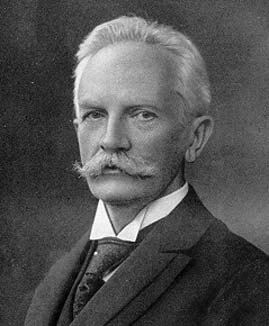


 تاريخ الرياضيات
تاريخ الرياضيات
 الرياضيات في الحضارات المختلفة
الرياضيات في الحضارات المختلفة 
 الرياضيات المتقطعة
الرياضيات المتقطعة
 الجبر
الجبر
 الهندسة
الهندسة 
 المعادلات التفاضلية و التكاملية
المعادلات التفاضلية و التكاملية 
 التحليل
التحليل
 علماء الرياضيات
علماء الرياضيات |
Read More
Date: 17-3-2017
Date: 25-3-2017
Date: 25-3-2017
|
Died: 10 May 1924 in Halle, Germany

August Gutzmer's parents were Carl August Friedrich Gutzmer, a master carpenter, and Wilhelmine Schultze. The family were members of the Evangelical Lutheran Church, and August was baptized into this church. From April 1868, when he was eight years old, he lived in Berlin where he attended the Friedrichswerdersche Gymnasium. He began his studies at this high school in 1870, studying there for eleven years before taking his final examinations on 28 September 1881.
Gutzmer had not studied foreign languages at school so he did not gain the required passes in his final examinations to obtain university entrance. Nevertheless he was still able to attend mathematics lectures at Berlin Unversity despite not being registered as a student. During this time he also studied Latin with aprivate teacher to obtain the necessary qualifications to matriculate. On 3 April 1884 he took the Latin examination at the Sophien Realgymnasium in Berlin and, having obtained the necessary pass, he registered as a student at Berlin University on 27th of that month.
Among those who lectured to Gutzmer in mathematics were L Kronecker, K Weierstrass and L Fuchs. This was right at the end of the "golden period" for mathematics in Berlin. Kummer had decided to retire in 1883 and had been replaced by Fuchs. Kronecker died in 1891 and Schwarz succeeded Weierstrass one year later. Gutzmer, therefore studied with two of the three great Berlin mathematicians, Kronecker and Weierstrass, in the last years of their careers. After completing his studies in 1887 he began studying for his doctorate under the supervision of A Wangerin at Halle-Wittenberg. He submitted his theses Über gewisse partielle Differentialgleichungen höherer Ordnung (On certain partial differential equations of higher order) to the University of Halle-Wittenberg and was awarded his doctorate on 13 January 1893. A publication arising from his doctoral thesis Über gewisse lineare Differentialgleichungen was published in the Jahresberichte der Deutschen Mathematiker vereinigung in 1894.
Soon after the award of his doctorate Gutzmer married Helene von Bannasch from Friedland, Kreis Beeskow. She owned a manor and Gutzmer was employed in the administration of the manor for the first year of his married life. However the manor was sold and the couple moved to Berlin where Gutzmer was an assistant at the Technischen Hochschule of Charlottenburg. Their first child, a daughter Irene, was born on 25 May 1894. From 1 October 1894 to 9 January 1895 Gutzmer was in the army but dismissed as being unfit for duty. He returned to his position at the Technischen Hochschule, but also worked during this period on his habilitation thesis. He submitted his thesis Zur Theorie der adjungierten Differentialgleichungen (On the theory of adjoint differential equations) to the University of Halle-Wittenberg on 23 April 1896 and worked there as a privatdozent until March 1899.
He was appointed as professor of mathematics at the University of Jena, holding this post from 1899 until 1905. He also worked for the German Mathematical Society producing yearly reports, for example: Jahresversammlung der Deutschen Mathematiker-Vereinigung zu München, 17-23 September 1899; Jahresversammlung der Deutschen Mathematiker-Vereinigung zu Aachen, 16-23 September 1900; and Bericht über die Jahresversammlung in Breslau, vom 18 bis 24 September 1904. During his time working at Jena he was offered a position on the Board of Education, but rejected so that he could continue teaching.
On 3 August 1905 Gutzmer took up an appointment to an ordinary professorship at the University of Halle-Wittenberg. Although he undertook work advising the government through World War I, he remained at Halle being rector of the university during session 1914-1915. He gave a rectorial address entitledZum Jubiläum der Logarithmen. He was asked to continue as rector for a second session, but by this time his health was deteriorating so he declined.
Highly gifted as a teacher, showing infectious enthusiasm for his topic, Gutzmer taught courses on a wide variety of topics including differential and integral calculus, and analytic geometry at lower level. Among the advanced courses he taught we list: ordinary differential equations, analytic mechanics, calculus of variations, number theory, higher algebra, function theory and the theory of algebraic curves.
Gutzmer received many honours. He was elected to the German Academy of Scientists Leopoldina in 1900, being elected president of this famous academy in 1921. He was president of the Commission for Mathematical and Scientific Instruction from 1904 to 1907 and president of German Committee for Mathematical and Scientific Instruction from 1908 to 1913.
Articles:
1-A Krazer, Zum Gedächtnis an August Gutzmer, Jber. Deutsch. Math.-Verein. 33 (1925), 1-3.
2-E Salkowski, August Gutzmer, Unterrichtsbl. Math. u. Naturw. 30 (1924), 62-65.
3-S Schmerling, August Gutzmer (1860 - 1924) (September 1998)
http://www.mathematik.uni-halle.de/history/gutzmer/index.html



|
|
|
|
دراسة يابانية لتقليل مخاطر أمراض المواليد منخفضي الوزن
|
|
|
|
|
|
|
اكتشاف أكبر مرجان في العالم قبالة سواحل جزر سليمان
|
|
|
|
|
|
|
اتحاد كليات الطب الملكية البريطانية يشيد بالمستوى العلمي لطلبة جامعة العميد وبيئتها التعليمية
|
|
|